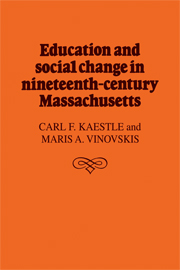Book contents
- Frontmatter
- Contents
- List of tables and figures
- Preface
- 1 Education and social change: Massachusetts as a case study
- 2 Trends in school attendance in nineteenth-century Massachusetts
- 3 From apron strings to ABCs: school entry in nineteenth-century Massachusetts
- 4 The prospects of youth: school leaving in eight Essex County towns
- 5 From one room to one system: the importance of rural–urban differences in nineteenth-century Massachusetts schooling
- 6 Education and social change in two nineteenth-century Massachusetts communities
- 7 Trends in educational funding and expenditures
- 8 The politics of educational reform in mid-nineteenth-century Massachusetts
- 9 Conclusion: the triumph of a state school system
- Appendix A Statistical tables
- Appendix B Definition of the variables contained in Tables A2.1 through A2.5, Appendix A
- Appendix C Discussion of adjustments, estimates, and extrapolations made in calculating Tables A2.1 through A2.5, Appendix A
- Notes
- Bibliography
- Index
3 - From apron strings to ABCs: school entry in nineteenth-century Massachusetts
Published online by Cambridge University Press: 05 October 2010
- Frontmatter
- Contents
- List of tables and figures
- Preface
- 1 Education and social change: Massachusetts as a case study
- 2 Trends in school attendance in nineteenth-century Massachusetts
- 3 From apron strings to ABCs: school entry in nineteenth-century Massachusetts
- 4 The prospects of youth: school leaving in eight Essex County towns
- 5 From one room to one system: the importance of rural–urban differences in nineteenth-century Massachusetts schooling
- 6 Education and social change in two nineteenth-century Massachusetts communities
- 7 Trends in educational funding and expenditures
- 8 The politics of educational reform in mid-nineteenth-century Massachusetts
- 9 Conclusion: the triumph of a state school system
- Appendix A Statistical tables
- Appendix B Definition of the variables contained in Tables A2.1 through A2.5, Appendix A
- Appendix C Discussion of adjustments, estimates, and extrapolations made in calculating Tables A2.1 through A2.5, Appendix A
- Notes
- Bibliography
- Index
Summary
Despite periodic enthusiasm for infant schools, kindergartens, and Head Start programs, progressive educational thought in America has not always endorsed early schooling. In the period from 1830 to 1880, educational spokesmen and medical authorities counseled against the school education of children between the ages of two and four or even five, and they waged a slow but successful battle with parents to keep children of those ages at home. Although in the early nineteenth century it was normal for very young children to attend dame schools, infant schools, or district schools, by the mid-nineteenth century educators counseled against sending three- or four-year-olds to any school. Furthermore, whereas in the late eighteenth and early nineteenth centuries children were encouraged to learn to read at an early age, by the mid-nineteenth century educators argued that children should not engage in such disciplined intellectual activities too early.
Children, parents, and the schools in colonial Massachusetts
Education had been one of the cornerstones of Puritan society. Because the Puritans believed that reading and understanding the Bible were essential to the religious development of their children, they considered it important to insure opportunities for rudimentary education. Early leaders in Massachusetts assumed that parents would instruct their children in reading and writing, as well as in religion. They expected parents to catechize their children at home as a normal part of their initial religious training.
- Type
- Chapter
- Information
- Publisher: Cambridge University PressPrint publication year: 1980



